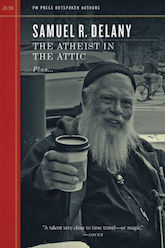Sometimes it seems as if all the publishers and bookstores of the land are engaged in a conspiracy to make Samuel Delany appear less unusual than he is. All of his fiction, whether autobiographical, experimental, pornographic, or some combination of the three, is shelved under “science fiction,” and while a given edition of Dhalgren might or might not advertise its million-seller status, it’s unlikely that any back cover copy will address that book’s games with structure, experiments in typography, or literal unendingness. It’s not until you actually open the books that you realize you’re in the hands of one of SF’s great experimenters. Sometimes Delany himself seems to be in on this game of concealment. His author biography coyly states, for example, that “his four-volume series Return to Nevèrÿon is sword-and-sorcery,” as if he were a latter-day Robert E. Howard, eliding any sense that these strange books, with their disquisitions on language, their Matryoshka structures and their shifting narrators, might better be described as sword, sorcery, and semiotics.
How, then, to best introduce a reader to this strange and wonderful writer? I had hoped the book under review might fit the bill.
Buy the Book


The Atheist in the Attic (Outspoken Authors)
The Atheist in the Attic is the twentieth installment of the PM Press Outspoken Authors series. These small books—usually, but not exclusively, by science fiction or fantasy authors—combine new or reprinted fiction, an interview between the subject and series editor Terry Bisson, and a bibliography. What the publisher won’t tell you is this: there are really two kinds of books in the series. The first kind of book, like Ursula K. Le Guin’s The Wild Girls, Elizabeth Hand’s Fire., or John Crowley’s Totalitopia, could function as a primer on the author: they’re both representative and welcoming. The second sort of volume, for example Michael Moorcock’s Modem Times 2.0, seems to demand knowledge of and engagement with the writer concerned. The Atheist in the Attic ends up belonging to this second category.
The collection’s title novella, the only piece of fiction included in this volume, was serialized over two issues of Conjunctions in 2016, but never before published in book form. “Atheist” purports to be an extract of a diary kept by a young Gottfried Wilhelm Leibniz of a 1676 visit to Amsterdam and The Hague on which he met philosopher Baruch Spinoza, who was then judged as disreputable on account of being Jewish and as wicked on account of being a (possible) atheist. Leibniz, for his part, is still a young man on the rise: he has not yet introduced calculus to the world, not yet quarreled with Newton, and not yet written his major philosophical works.
Leibniz’s narration is erratic, seeming at one and the same time obsessive and absent-minded. Small matters beget great digressions, such that a single sentence on the philosopher’s travel arrangements requires three sets of parentheses, seven dashes, and half a page. At times, interpreting these sentences can feel like solving a particularly complex equation.
“The Atheist in the Attic” must surely number among Delany’s least accessible stories: although his writing has always engaged with philosophy and history, Delany rarely assumes that his readers share the same copious breadth and stunning depth of his own knowledge. As he writes elsewhere in this volume, “there is so much knowledge available today that there can be no such thing anymore as a classical education that we can expect more than a relatively few people to share.” Delany presumes his novella will have the best of all possible readers: I was both flattered by the author’s trust and stymied by the novella’s oblique difficulty. For all that it frustrated me, I’d like to read it again.
Although “The Atheist in the Attic” is, along with most of Delany’s work in the last twenty years, liable to disappoint anyone reading for science fictional speculation, the volume’s concluding interview does offer some interesting information on this story’s unlikely genre origins. “Atheist,” Delany explains, is a sort of pendant to Through the Valley of the Nest of Spiders, as “Spinoza is the philosopher whose name lurks behind that book.” And perhaps this “very small and slight novella” is best read in conjunction with that very large and very uncompromising novel, which includes fairly lengthy extracts from Spinoza’s Ethica.
The second piece in this collection, “Racism and Science Fiction,” first appeared in the August 1998 issue of The New York Review of Science Fiction. (I’m told that some people think it’s the single best essay that journal has yet published.) Elsewhere in this volume, Delany insists that he’s “ not a scholar”—just as well, since his prose is likely too clear to pass peer review—yet this essay shows him to be a few decades ahead of the academy. He devotes several paragraphs to African-American author George Schuyler’s Black No More, a savage fantasia about race from 1931 that had, by 1998, been neglected for decades. In 2011, Dover published an edition of the novel; earlier this year, Black No More appeared as a Penguin Classic. Were “Racism and Science Fiction” a wholly impersonal history, it would be a remarkable and necessary document, if perhaps a little abstract. But Delany is more honest and more brave a writer than that, and so he incorporates his personal experiences as a black man in a genre, that, despite all its claims of being forward-thinking, never could acclaim, condemn, or otherwise discuss him without reference to his race: “transgression inheres, however unarticulated, in every aspect of the black writer’s career in America.” It’s a bracing and at times painful read. An editorial postscript, dated to 2017, asks if Delany would change any of his analysis in the new millennium. Post-Katrina, post-Ferguson, post-Flint, post-Trump, can it be any surprise that his answer begins “not really”?
The Atheist in the Attic’s concluding interview with Terry Bisson is a pleasure: the two authors have known each other for nigh on forty years, and so Bisson knows just the sorts of questions needed to draw his interviewer out. Delany expands on some of the themes of “Racism and Science Fiction,” chats about writers and editors, discusses Spinoza, ponders New York gentrification, and dodges a question about what he’s working on next. There’s nothing revelatory, save perhaps Delany’s linking of “The Atheist in the Attic” with his most recent novel, but it’s an enjoyable conversation to listen in on.
What to make, in the end of this book? Its first part is a demanding curio, its second an essential, but previously published work, and its third an enjoyable but not earth-shattering discussion. Given the novella’s difficulty and its apparent assumption that the reader has an uncommon knowledge of both the Delany oeuvre and the Western philosophical canon, The Atheist in the Attic should probably be no reader’s first Delany. The audience for this book is small and self-selecting, but if you’ve read Delany and read this review and remain intrigued, I highly recommend this newest title.
The Atheist in the Attic is available from PM Press.
Matt Keeley reads too much and watches too many movies; he is helped in the former by his day job in the publishing industry. You can find him on Twitter at @mattkeeley.










